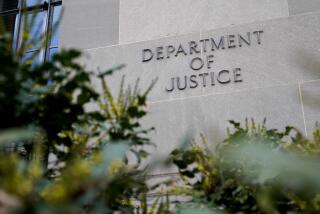Ex-Employee Accuses Apria of Giving Kickbacks
- Share via
COSTA MESA — Apria Healthcare Group Inc. faces allegations of giving kickbacks to medical providers nationwide in exchange for receiving patient referrals for the Costa Mesa-based company’s home medical services.
The alleged schemes were disclosed as part of a lawsuit by a whistle-blower in Atlanta who has charged that the company set up a phony consulting agreement with a Georgia medical group in exchange for getting referrals of patients who needed oxygen therapy at home. The Justice Department has intervened in the civil suit, and, according to sources, is conducting a parallel criminal investigation.
Robert S. Holcombe, Apria’s general counsel, confirmed Tuesday that Justice officials have investigated possible civil and criminal violations by the company. Holcombe said the company is cooperating in the investigation and that he was unaware if a grand jury had been impaneled to evaluate potential criminal actions.
Holcombe said the home health-care company denies the allegations.
“Our outside counsel has had ongoing discussions with government investigators and we have no reason to believe that this is a case where there would be any serious criminal consequences,” he said.
Apria, the Costa Mesa-based health-care company that supplies oxygen, infusion and other services to home-based patients, is the largest player in an industry undergoing increasing scrutiny by the Justice Department for possible violations involving tax-supported health-care plans. Laws forbid medical providers from receiving inducements in exchange for referring patients on Medicare, Medicaid or other federal insurance programs.
Michael Bothwell, the lawyer for the former employee, says the company appears to have entered into 150 to 200 similar agreements with doctors and other medical providers across the country.
He wouldn’t estimate how much money may have changed hands, but believes the alleged Atlanta deal alone amounted to at least $400,000 to $500,000 in business revenue for Apria.
*
The litigation began last year when Mark Parker, a former Apria branch manager, sued the company on behalf of himself and the government for allegedly giving kickbacks to an Atlanta medical group and a hospital in El Paso, Texas, in exchange for patient referrals.
This year, the Justice Department chose to intervene in a portion involving the Atlantic matter, but left the other issues up to Parker’s lawyer to pursue.
Parker filed his case under a federal law enabling individuals to sue on the government’s behalf. Of the 1,434 such cases brought by individuals on a range of issues in the last decade, the Justice Department has intervened in only 15% of them.
Government recoveries in those cases that involved health-care fraud have increased dramatically, from $32 million in the fiscal year ended Sept. 30, 1989 to $243 million for fiscal year 1995.
Last year, in one of the government’s largest health-care fraud cases ever, Caremark Inc. of Northbrook, Ill., paid $161 million to settle civil and criminal claims that it defrauded the government by making improper payments to induce doctors and other professionals to refer patients to its home infusion company and certain other health-care businesses.
Caremark has sold the home infusion business and canceled contracts with doctors and other referral sources.
Holcombe said Apria relies on referrals to patients on federal insurance plans for about 45% of its revenue. The company, a product of the 1995 merger between two Orange County-based rivals, Abbey Healthcare Group Inc. and Homedco Group Inc., last year reported a net loss of $74.5 million, or $1.58 a share, on revenue of $1.1 billion.
In New York Stock Exchange trading Tuesday, the company’s stock closed at $18 a share, down 75 cents for the day.
More to Read
Inside the business of entertainment
The Wide Shot brings you news, analysis and insights on everything from streaming wars to production — and what it all means for the future.
You may occasionally receive promotional content from the Los Angeles Times.









